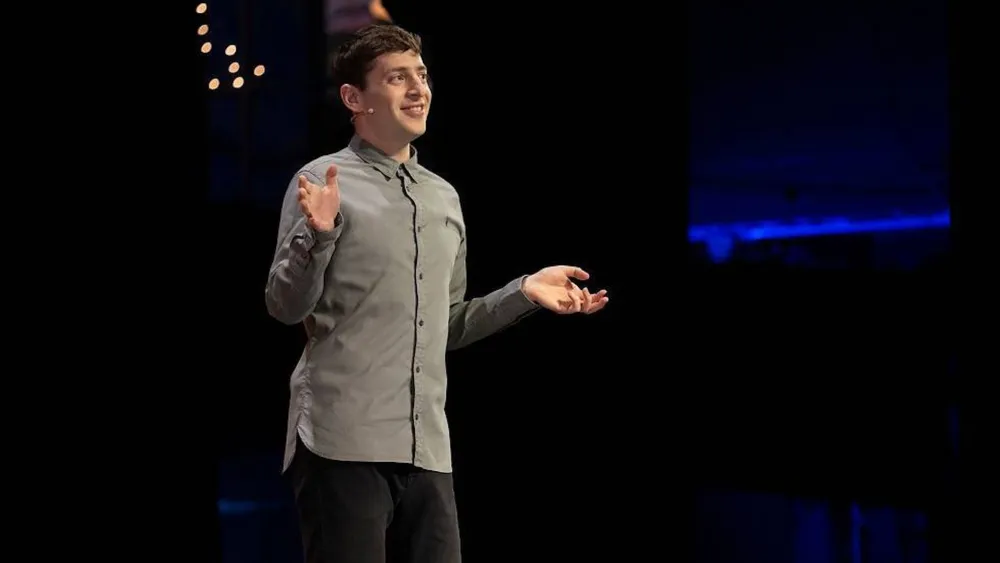Alex Edelman’s ‘Just For Us’ premieres on HBO and Max, with Jewish identity and antisemitism again in the spotlight

Alex Edelman’s antisemitism-focused one-man show, “Just For Us,” is premiering on HBO as a comedy special. (Courtesy Max)
(JTA) — Alex Edelman’s acclaimed comedy special “Just For Us,” about his experience as a Jew attending a white supremacist meeting in New York City, first premiered at the Melbourne International Comedy Festival in the summer of 2018.
Months later, the worst antisemitic attack in American history occurred when a white supremacist killed 11 worshippers at a Pittsburgh synagogue. Since then, “Just For Us” has racked up positive reviews as Edelman’s meditation on whiteness and Jewish identity has moved from off-Broadway to Broadway and beyond. It will premiere on HBO and the streaming service Max on Saturday.
But even as it hits screens at the six-month mark of another Jewish tragedy — Hamas’ Oct. 7 invasion of Israel, which launched the ongoing war in Gaza and a reported spike in anti-Jewish hate crimes in the United States — Edelman says the show isn’t about antisemitism, but assimilation.
In other words, it aims to raise the question of how Jews, or anyone, can fit into a society where they aren’t always comfortable. It asks: Where do I really belong? How can I connect with people across seemingly unbridgeable differences? How empathetic should I be when those gaps can’t be closed?
“There’s a question that everyone is asking and everyone is interested in, which is: What is our place in the world?” Edelman told the Jewish Telegraphic Agency on Friday. “That question has seemed a lot more visceral to Jews, and non-Jews, in the past couple of months.”
While Edelman has packed theaters in major cities around the country, the streaming special — and promotional appearances this week on “The View” and “The Tonight Show with Jimmy Fallon” — makes his brand of Jewish comedy accessible to audiences with potentially little exposure to Jews in their own lives. It also takes a conversation about Jewish identity mainstream — and back to an earlier era.
Watching (or rewatching) “Just For Us” brings viewers to a setting — a meeting of white supremacists in Queens — that is reminiscent of a very recent, but different, era of rising antisemitism. It was a time when terms like “white nationalists,” and the “alt-right” (which appear in the show and its promotional materials) were more at the center of conversation.
Conversations about antisemitism in recent months have usually revolved around Israel, its war in Gaza and anti-Zionism (though watchdogs say white supremacists also feel emboldened by this moment). Edelman said the passage of time, and the way antisemitic discourse has changed in the past six years, doesn’t alter the show’s resonance.
(Speaking to JTA in 2021, Edelman also recognized that the show would stay relevant even as the headlines changed: “I don’t think antisemitism is ever going out of style.” he said then — an insight he later called “brutally depressing.”)
“It’s about the rumination on how one deals with being a person from a specific group in a world where they don’t always feel they belong,” he said. “I’ve been doing the show since 2018 and if it was beholden to the vicissitudes of what types of antisemitism were prominent at the moment, the show would have felt out of step at one point or another.”
Edelman said the past six months have affected the way audiences, particularly Jewish viewers, receive the show.
“All comedy at its best should be conversant with the moment but also an escape from it,” he said. “Personally doing the show has been a pretty cathartic experience and has been made a little more cathartic by the fact that Jews of every political persuasion have been pretty thoughtful in how they engage with me on it afterward.”
Not just Jews. This week the legendary Monty Python comedian Eric Idle tweeted, “I was fortunate to catch the very last performance of Alex Edelman’s remarkable stand-up, anecdotal play, Just for Us at the Taper on Sunday. Luckily you can see it soon on HBO. Don’t miss it, it’s an extraordinary evening. He has moved the boundaries of comedy. Bravo!” Edelman’s response: “Oh my gosh.”
Edelman references Israel a couple of times in the story he weaves over the course of “Just For Us” — the precipitating event occurs when he adds Twitter antisemites to a list called “Jewish Nat’l Fund Donors.” But it’s much more about Jewish identity in the United States and, more than anything, his identity. His narrative moves seamlessly between stories of his Orthodox Jewish childhood and the 2018 white supremacist meetup.
The show has traveled around the United States and beyond, and like much of Edelman’s comedy, it is a high-energy experience. He molds his face and body into exaggerated expressions while sometimes literally jogging back and forth or in circles around the stage. Like the performances of one of his mentors and an executive producer of “Just For Us,” Mike Birbiglia, he punctuates uproarious anecdotes with contemplative interludes and long, silent pauses.
Edelman has also had to cope with personal tragedy during the show’s Broadway run and now its HBO premiere: His close friend and longtime director and creative partner Adam Brace died last April, shortly before the Broadway opening. “I miss him terribly, terribly,” Edelman said.
In 2021, Edelman had told JTA that he was considering making his next special about Israel. The past six months have affected that thinking, he said, but he also said he’s weighing that idea “maybe a bit more hesitantly” because Brace won’t be there to work on it with him.
“I miss my friend, chiefly, but creatively I miss the difficult conversations we’d have,” Edelman said. “They were very Talmudic, those conversations. They were big holistic discussions about art and what it should do, and very granular, about how to access those big holistic things.”
Since it premiered in 2018, “Just For Us” has evolved — and so, Edelman said, has the meaning of its title. He has an informal list of possible interpretations of those three words that now has more than 20 entries.
“It’s an invitation to consider the ambiguities of who ‘us’ is,” he said of the title. “I want more ambiguity in my work.” He then made an analogy to two different sections of a standard page of Talmud, and explained: “I want it to be more something that you pick apart and argue and discuss, and less something that offers a specific truth.”
This article originally appeared on JTA.org.

I hope you appreciated this article. Before you go, I’d like to ask you to please support the Forward’s award-winning journalism this Passover.
In this age of misinformation, our work is needed like never before. We report on the news that matters most to American Jews, driven by truth, not ideology.
At a time when newsrooms are closing or cutting back, the Forward has removed its paywall. That means for the first time in our 126-year history, Forward journalism is free to everyone, everywhere. With an ongoing war, rising antisemitism, and a flood of disinformation that may affect the upcoming election, we believe that free and open access to Jewish journalism is imperative.
Readers like you make it all possible. Today is the last day of our Passover Pledge Drive and we still need you to step up and make a gift to sustain our trustworthy, independent journalism.
Make a gift of any size and become a Forward member today. You’ll support our mission to tell the American Jewish story fully and fairly.
— Rachel Fishman Feddersen, Publisher and CEO
Join our mission to tell the Jewish story fully and fairly.
Today is the last day to contribute.






















